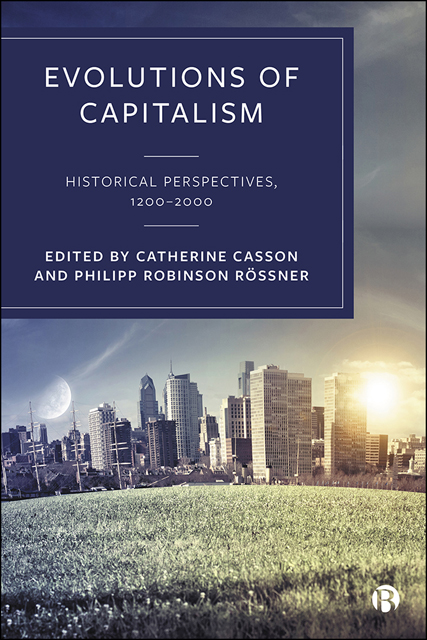Book contents
- Frontmatter
- Contents
- List of Figures and Tables
- Notes on Contributors
- Acknowledgements
- 1 Introduction
- 2 The Market as an Institution: Theory and History
- 3 Regulating Capitalism
- 4 Capitalism and State Ownership Models
- 5 Comparative and Connected Global Capitalism(s)
- 6 Capitalism, Imperialism and the Emergence of an Industrialized Global Economy
- 7 Religion and Capitalism
- 8 Capitalism and the Environment
- 9 Capitalism and Income Inequality
- 10 Conclusion
- Index
3 - Regulating Capitalism
Published online by Cambridge University Press: 13 October 2022
- Frontmatter
- Contents
- List of Figures and Tables
- Notes on Contributors
- Acknowledgements
- 1 Introduction
- 2 The Market as an Institution: Theory and History
- 3 Regulating Capitalism
- 4 Capitalism and State Ownership Models
- 5 Comparative and Connected Global Capitalism(s)
- 6 Capitalism, Imperialism and the Emergence of an Industrialized Global Economy
- 7 Religion and Capitalism
- 8 Capitalism and the Environment
- 9 Capitalism and Income Inequality
- 10 Conclusion
- Index
Summary
The scholastic heritage and beyond
Since the last millennium modern capitalism in the West has evolved around two seemingly diametrically opposed notions – one being the assumption of the market as a manifestation of providential or God-given natural order, the other being about order as a result of deliberate, possibly even planned, human action and sometimes proactive interventions of the state. The earlier notion found its way into neoliberalism and other models of freemarketeerism from the Physiocrats (Kaplan and Reinert, 2019) to Friedman. The other has informed coordinated capitalism from post-1600 cameralism to post-1945 ordoliberalism. This tension has shaped evolutions of political economy of markets and regulation in the West.
In this chapter the tension is resolved by demonstrating that it was only fairly recently (post-1900) that political economy has come to misunderstand what initially was a result of a symbiotic and logical relationship – order and freedom – as opposites. Certainly the Second World War (1939– 45) and post-war ideological manifestos such as Hayek's Road to Serfdom or Friedman's Capitalism and Freedom have wrought considerable damage in the collective economic mind by positing that human economy was, above all, about choice; and that human agency could only be guaranteed by a lean state (Friedman, and his other popular works co-authored with his wife); that capitalism was above all a question of freedom (not true) and that government needs, in the political and economic process, to be principally understood as a potential enemy, not friend, of the people (or individual). Human choices should unfold freely according to individual rational preferences in the marketplace. The metaphor of market has influenced neoliberal historians to the present day, and it is not uncommon to portray the rise of a European ‘culture of growth’ (Mokyr, 2017) as a trajectory based on ‘markets for ideas’, just to name a fairly recent influential contribution. But as was understood by the medieval schoolmen, reformers such as Luther or the cameralists and mercantilists (Schumpeter, 1954; Elmslie, 2015; Rossner, 2015; Rossner, 2020), we cannot conceive freedom in the market without the notion of order: only unregulated or weakly regulated markets (with an absence of order) allow rent-seekers, monopolists, cartels, profiteers and other wolves to devour the unbeknown sheep in the marketplace.
- Type
- Chapter
- Information
- Evolutions of CapitalismHistorical Perspectives, 1200-2000, pp. 53 - 72Publisher: Bristol University PressPrint publication year: 2022



